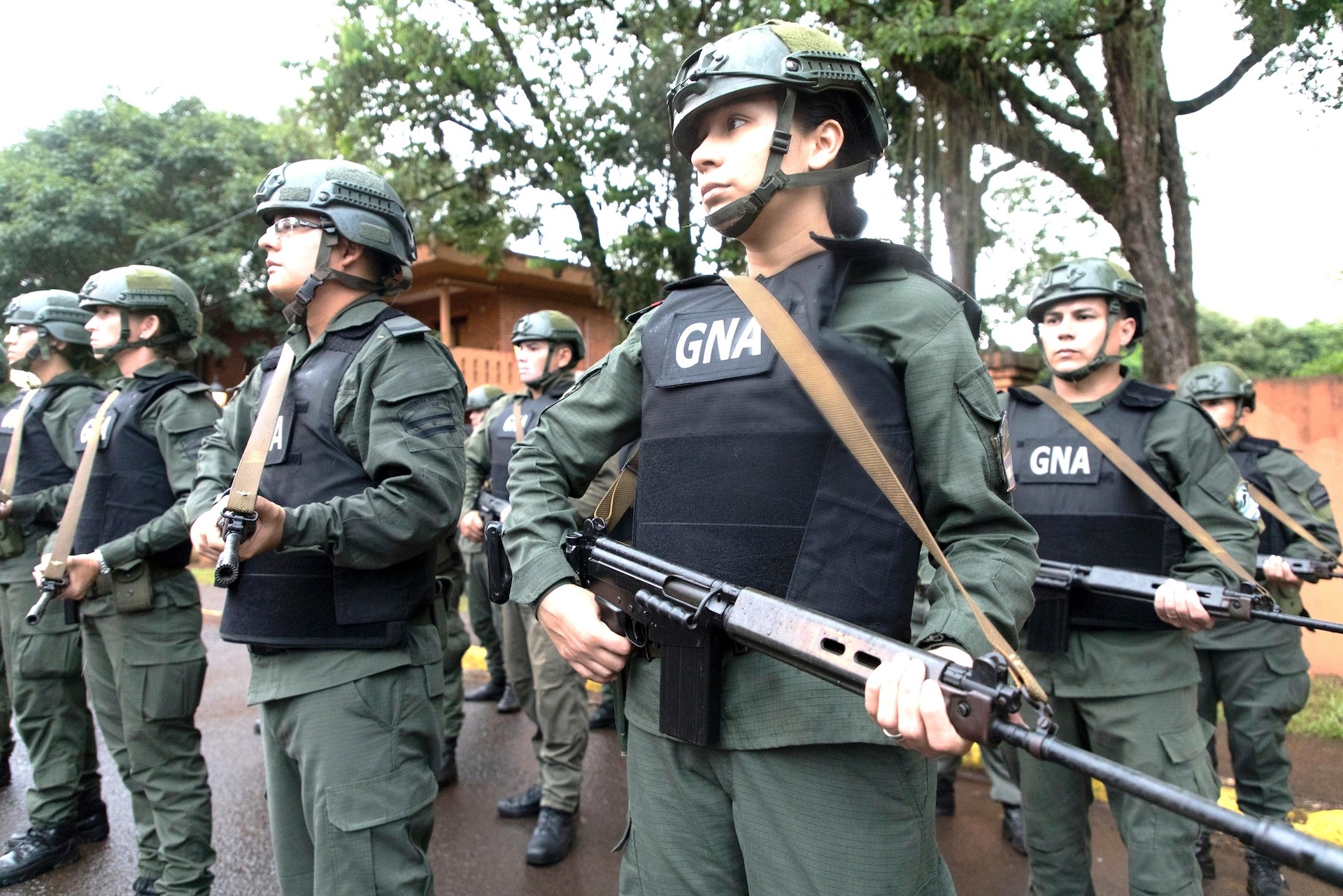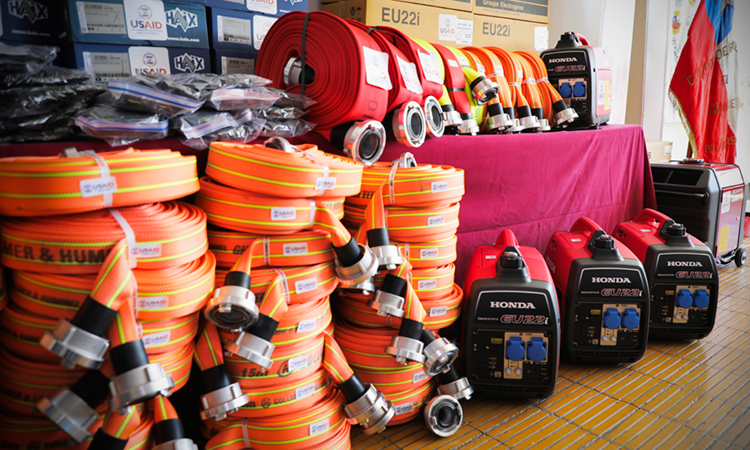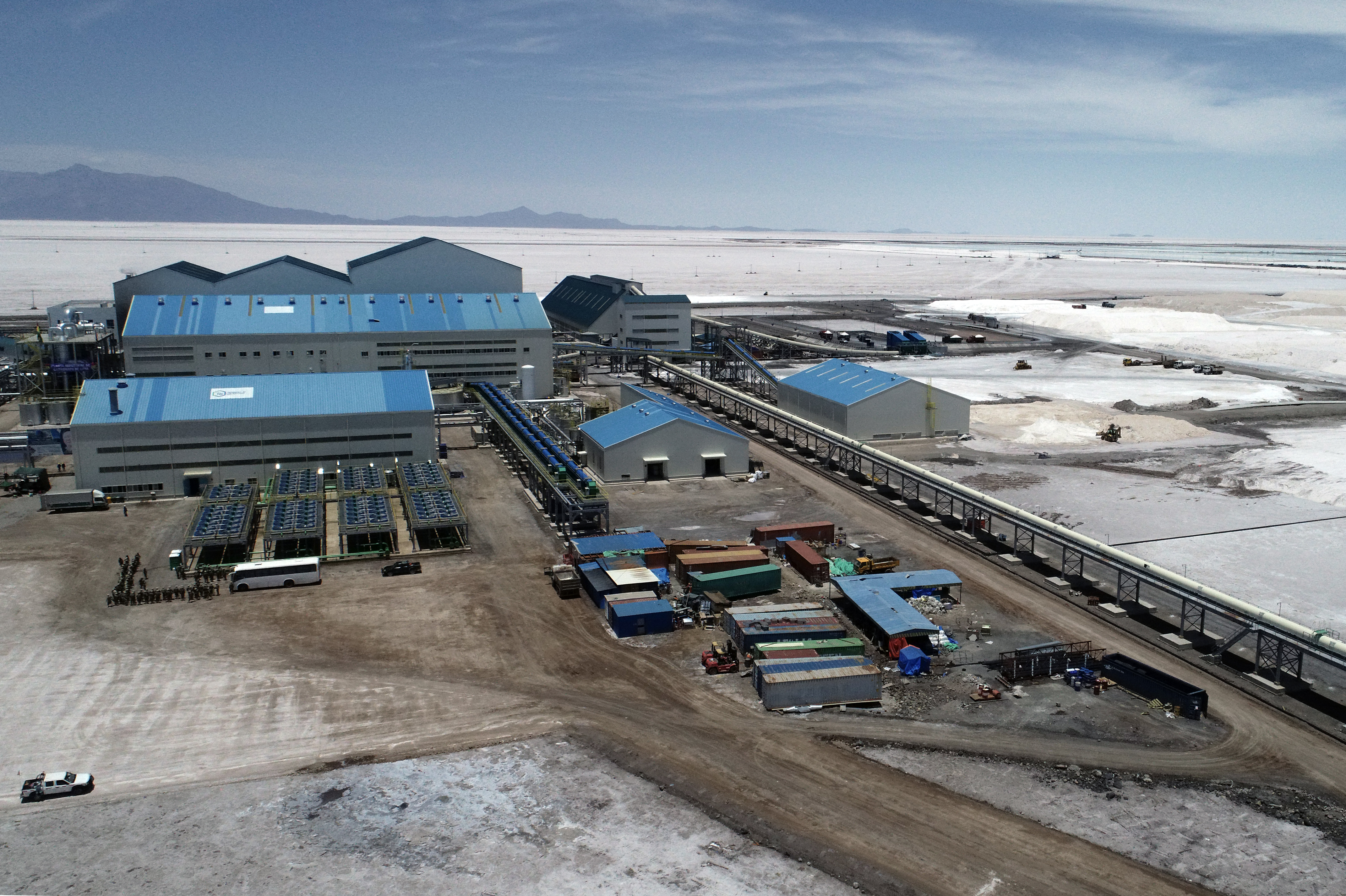US Government Donates Aircraft to Dominican Republic to Combat Narcotrafficking
 The U.S. government donated an aircraft to the Dominican Republic Ministry of Defense to combat narcotrafficking, in Santo Domingo, February 16, 2024. (Photo: U.S. Embassy in the Dominican Republic)
The U.S. government donated an aircraft to the Dominican Republic Ministry of Defense to combat narcotrafficking, in Santo Domingo, February 16, 2024. (Photo: U.S. Embassy in the Dominican Republic)
BY U.S. EMBASSY IN THE DOMINICAN REPUBLIC
MARCH 01, 2024
The U.S. government, through the Department of Defense, donated an aircraft valued at more than $8 million to the Dominican Republic Ministry of Defense, in support of the shared fight against illicit narcotics trafficking by transnational criminal organizations and in support of the country’s efforts to provide humanitarian assistance in the event of disasters.
The official ceremony took place at San Isidro Air Base, headed by Dominican Republic Minister of Defense Lieutenant General Carlos Luciano Díaz Morfa, and Patricia Aguilera, chargé d’Affaires of the U.S. Embassy.
The donation of this Cessna model aircraft responds to the Dominican Republic’s success in the fight against narcotrafficking in the region. The aircraft will allow greater control of air and maritime spaces, which will help the Dominican Republic prevent the entry and transit of illicit materials through the country.
It will also serve as another tool to allow the United States and the Dominican Republic to increase interoperability, leading to an even more fluid collaboration to achieve common security objectives.
During the aircraft handover ceremony, the U.S. chargé d’Affaires referred to bilateral cooperation and expressed that “the incredible courage, strength, and teamwork demonstrated daily between the Dominican Republic and the United States to combat transnational crime is only possible because of our strong partnership and shared vision of a secure and crime-free region.”
Minister of Defense Lt. Gen. Díaz Morfa emphasized that “this important gesture symbolizes the firm intention of the U.S. to always collaborate, in a decisive and timely manner, in maintaining our high degree of operational readiness, an attribute that has always characterized the actions of our Dominican Armed Forces.”
Likewise, Vice Admiral José M. Cabrera Ulloa, president of the National Drug Control Directorate (DNCD), thanked the U.S. government for the great support the country has received in recent years to confront narcotrafficking and related crimes.
“For us, this cooperation has been very helpful because it has allowed us to strengthen our operational capability and continue to face together the common threats of both peoples,” said Vice Adm. Ulloa.
The event was attended by Major general Carlos R. Febrillet Rodríguez, commanding general of the Dominican Republic Air Force (FARD); Lieutenant Colonel Lowell Krusinger, military attaché of the U.S. Embassy; Vice Admiral José Manuel Cabrera Ulloa, president of the National Drug Control Directorate (DNCD); Luis Soto, director general of the National Investigations Department (DNI); and Brigadier General Alberto Montás Castillo.
Share on Social Media
Argentina Inaugurates Terrorism and Organized Crime Center
 Members of the Argentine National Gendarmerie stand on guard at the criminal intelligence analysis center in the Triple-Border, inaugurated on January 15, 2024, to combat organized crime and possible terrorist cells on the border shared by Argentina, Brazil, and Paraguay. (Photo: Ministry of Security of Argentina)
Members of the Argentine National Gendarmerie stand on guard at the criminal intelligence analysis center in the Triple-Border, inaugurated on January 15, 2024, to combat organized crime and possible terrorist cells on the border shared by Argentina, Brazil, and Paraguay. (Photo: Ministry of Security of Argentina)
BY JUAN DELGADO/DIÁLOGO
MARCH 01, 2024
The Argentine government has a new Criminal Intelligence Analysis Center to support operations against narcotrafficking organizations and groups linked to terrorism. The center, in Puerto Iguazú, in the Tri-Border area shared by Argentina, Brazil, and Paraguay, was inaugurated on January 15, La Nación reported.
“This initiative, beyond combating organized crime, is a collaboration to establish a monitoring unit in the Tri-Border area,” Fabián Calle, a political analyst and professor of International Relations at Argentina’s Austral University, told Diálogo on February 12. “For years, terrorist groups have been detected there that have connections with the Lebanese group Hezbollah, backed by Iran, which is trying to strengthen its presence in Latin America.”
The objective of the Center is to implement strategies against illegal trade, money laundering, organized crime, corruption, and of course the presence of possible terrorist cells, Argentina’s Security Minister Patricia Bullrich told the press.
Emblematic area
According to Argentine news site Infobae, the center’s location was chosen for being an emblematic area where the three nations converge
The area is known to have porous border crossings, where organized crime with strong links to terrorism often operate to smuggle illicit goods, La Nación reported.
For Calle, it is essential to strengthen and, in some cases, re-establish cooperation ties with the intelligence services of the United States, Israel, Germany, and the rest of the world, due to the threat from Hezbollah and other Iran-backed terror groups operating in Latin America.
“At present, federal forces based in the region from Argentina, Brazil, and Paraguay are jointly monitoring criminal actions and possible cells related to terrorism,” the Argentine Ministry of Security said.
The new center will have permanent technical and specialized support to optimize efficiency and effectiveness in the prevention and fight against crimes. In addition, the center will perform strategic studies to anticipate new crime scenarios that will help institutional decision-making.
Hemispheric support
In early February, Chief of the Cabinet of Ministers of Argentina Nicolás Posse met with U.S. Army Major General Scott Jackson, chief of Staff of U.S. Southern Command (SOUTHCOM), in Florida, strengthening ties of friendship and both countries’ common national security objectives.
According to Infobae, the Argentine Federal Intelligence Agency (AFI) and the CIA have evidence of Hezbollah’s activities in the Triple-Border, and both organizations, with SOUTHCOM’s support, are set to operate to stop terrorist groups’ operations in Latin America.
Argentina designated Hezbollah as a terrorist organization in July 2019 and focuses its attention on the organization’s money laundering operations in the Triple Frontier, known as a hub of criminal activity.
On March 17, 1992, Hezbollah bombed the Israeli Embassy in Argentina, killing 22 people. Two years later, on July 18, 1994, also in Buenos Aires, a car bomb exploded at the headquarters of the Argentine Israelite Mutual Association (AMIA) in Buenos Aires, killing 85 people, marking Hezbollah’s first attacks in Latin America.
On December 10, 2023, as Javier Milei assumed the presidency of Argentina, he vowed to strengthen key cooperation alliances with the United States and Israel.
“We must be very attentive with a pro-Western liberal government, with positive and close relations with the United States or Israel as is the case of Milei,” Calle said. “The sectors linked to the Castro-Chavist-Iranian circuits will not rule out trying to punish Argentina for having ‘dared’ to elect a liberal president with Western policies.”
Days before the Hamas October 7, 2023 attack on Israel, the Argentine Foreign Ministry received sensitive information from its Embassy in Iran, warning that the Bolivian representation in Tehran was issuing visas to Iranian citizens “with minimal conditions,” Argentine newspaper Clarín reported on October 30.
“A hot zone is opening up that has to do with Iran and its allies in Bolivia, where the border with Argentina is porous,” Calle said. “This situation is worrying the U.S., Israeli, and Argentine intelligence, as there is evidence of delivery of documents to Iranian citizens circulating with Bolivian documentation.”
Hezbollah’s presence in Latin America has been documented since the 1990s. The organization, which controls southern Lebanon with the support of Iran, expanded throughout the world, sheltered by the Lebanese communities resulting from the exodus caused by the civil war between 1975 and 1990.
The list of illicit trades in the region includes drug, arms, and human trafficking; smuggling; wildlife smuggling; counterfeit tobacco and alcohol products; and gold trafficking, among others.
The problem of terrorism is on the agenda of Argentine government officials and alerts persist. “The important thing is for security measures to work together to avoid terrorist activities in the region, after the attack suffered by Israel by the Hamas group,” Calle concluded.
US Donates Firefighting Equipment to Chilean Firefighters
 The U.S. Government is mobilizing its support through assistance to the tireless work being done by firefighters, brigadistas, and so many others in fighting the fires affecting Chile (Photo: U.S. Embassy in Chile).
The U.S. Government is mobilizing its support through assistance to the tireless work being done by firefighters, brigadistas, and so many others in fighting the fires affecting Chile (Photo: U.S. Embassy in Chile).
BY U.S. EMBASSY IN CHILE
FEBRUARY 29, 2024
In early February, U.S. Ambassador to Chile Bernadette Meehan delivered a second batch of assistance consisting of electric generators, firefighter boots, forestry gloves, and slaves, at a ceremony held at the headquarters of the Quilpué Fire Department in the central region of Valparaíso, Chile. The U.S. Agency for International Development’s Office of Humanitarian Assistance (USAID/BHA) and U.S. Southern Command’s (SOUTHCOM) Humanitarian Assistance Program of the Department of Defense are providing $114,000 and $117,000, respectively, in firefighting and personal protective equipment for Chile’s firefighters.
During the ceremony, Ambassador Meehan emphasized that “Chile has suffered too much in these days and the people of the United States stand with you. My compatriots are following the news about the forest fires with great concern and with the desire to help Chile during these difficult times”.
In addition to this material assistance delivered in Quilpué and to other fire departments, Ambassador Meehan announced the delivery of a $100,000 aid package through USAID/BHA, which includes humanitarian assistance to communities affected by the fires in Valparaíso.
USAID/BHA currently has 13 experts on the ground in Chile, including the regional director for Latin America and the Caribbean and the office’s wildfire response coordinator.
This U.S. support and collaboration with Chilean firefighters, first responders, and affected communities go back decades, thanks to close collaboration through training courses, exchange of experiences, and capacity building, as well as the delivery of important cutting-edge technology, tools, and equipment to effectively prevent, combat and investigate the causes of wildfires, which also involves experts from CONAF and SENAPRED.
Russia and China Take the Lead in Rush for Bolivia’s Lithium
 Aerial view of Bolivia’s first state-owned lithium carbonate plant in the municipality of Colcha K, south of the Salar de Uyuni, in the department of Potosi, Bolivia, on December 15, 2023. (Photo: Jorge Bernal/AFP)
Aerial view of Bolivia’s first state-owned lithium carbonate plant in the municipality of Colcha K, south of the Salar de Uyuni, in the department of Potosi, Bolivia, on December 15, 2023. (Photo: Jorge Bernal/AFP)
BY NELZA OLIVEIRA/DIÁLOGO
FEBRUARY 21, 2024
Russia, just like China, has gained access to Bolivia’s lithium reserves, estimated at 23 million tons, and believed to be the richest known lithium deposits in the world. Bolivia’s seeming preference for China and Russia has experts worried, however, due to both countries’ low environmental standards and regulations for their companies and risks of corruption and inefficiency, among other issues.
The Bolivian government has already signed agreements with the Chinese consortium CATL BRUNP & CMOC (CBC), and the company Citic Guoan Group. In mid-December 2023, Bolivia also signed a $450 million deal with Russian state firm Uranium One Group, a subsidiary of Rosatom, giving Russia access to its reserves.
Under the agreement, the Russian firm will invest in Bolivia over two years in a pilot lithium production project in the community of Colcha K, in the department of Potosi, in three phases. In the first phase, the goal is to produce 1,000 tons of lithium carbonate per year, in the second phase up to 8,000 tons, and an additional 5,000 tons in the third phase. The contract is the second signed with Uranium One Group. In the first, in June 2023, the contracting parties agreed to build a lithium carbonate industrial complex in Pastos Grandes, in southwest Bolivia.
As Russia takes a key role in the extraction of lithium in Bolivia, experts worry about a potential environmental disaster. “Where Russia has handled energy resources, environmental incidents have been commonplace,” Joseph Bouchard, a Canadian analyst focusing on geopolitics and security in Latin America, wrote in an opinion piece for environmental news site Mongabay.
As for China, the first agreement was made in January 2023 with the CBC consortium, under the leadership of CATL, to invest a total of $1.4 billion in the installation of two industrial plants for the direct extraction of lithium in the Salar de Uyuni, the world’s largest salt desert. In June 2023, Bolivia signed a contract with Citic Guoan for the right to exploit lithium reserves in the Salar de Uyuni. More recently, on January 18, 2024, the CBC consortium signed another agreement deepening its cooperation in lithium exploration in the Salar de Uyuni, with an additional investment of $90 million.
Among the concerns with CATL are its link to Uyghur forced labor, the Diplomat reported. “A large chunk of China’s lithium processing and product manufacturing facilities are located in the Xinjiang Uyghur Autonomous Region, where China has been credibly accused of the mass internment and forced labor of Uyghurs and other minority groups,” the Diplomat reported. “Sectors such as mining, farming, and manufacturing are tainted by Uyghur forced labor, which is then tied to global supply chains.”
Professor Stella Christina Schrijnemaekers, coordinator of the International Relations, Foreign Trade, and Logistics courses at the University Center of the United Metropolitan Colleges in São Paulo, believes that it is vital for the country’s defense to be concerned about the negative socio-environmental effects in relation to the countries that win the bids. The two powers that came out on top have a history of human and labor rights violations, as well as disrespect for the environment.
“All countries must pay attention to human and labor rights issues in their own country, regardless of the actions of companies, whether national or multinational. Unfortunately, violations of laws and human rights, as well as misuse of natural resources, are not the prerogative of Russia or China,” Professor Schrijnemaekers told Diálogo. “It will be up to Bolivia to be vigilant,” she concluded.
Chinese Criminal Networks and Their Reach in Latin America
 Members of the Chinese community in Peru carry a dragon during the celebrations of the Chinese New Year in Lima's Chinatown on January 23, 2012. AFP PHOTO/ERNESTO BENAVIDES (Photo by ERNESTO BENAVIDES / AFP)
Members of the Chinese community in Peru carry a dragon during the celebrations of the Chinese New Year in Lima's Chinatown on January 23, 2012. AFP PHOTO/ERNESTO BENAVIDES (Photo by ERNESTO BENAVIDES / AFP)
BY JULIETA PELCASTRE/DIÁLOGO
FEBRUARY 16, 2024
Despite high rates of violence and corruption in Latin America and the Caribbean driven by criminal organizations from the hemisphere, a study by researchers at Florida International University (FIU) highlights the growing impact of Chinese criminal networks in the region and exposes their link to Chinese-state owned companies.PAONat
“They operate discreetly and stand out for their organization and sophistication, in contrast to the traditional dynamics of the region,” Diego Rojas, research coordinator at the Catholic University’s Center for International Studies in Chile, told Diálogo on January 19. “Their presence, although publicly hidden, challenges the usual operational logics in Latin America, stressing the importance of paying attention to this evolution of organized crime.”
The report, Triads, Snakeheads and Flying Money: The Underworld of Chinese Criminal Networks in Latin America and the Caribbean, reveals the criminal activities of these mafias, such as the trafficking of precursor chemicals for fentanyl, money laundering with “flying money,” and the illegal trafficking of people and exotic animals.
“These mafias take advantage of the limited visibility of their businesses in some areas. Their ability to maintain a low profile is sustained by the stealth operation backed by the business of Chinese communities in the region,” Rojas added. “Unlike the violent territorial dynamics observed in other criminal gangs in Latin America and the Caribbean, these groups demonstrate remarkable organization and selectivity in their business niches.”
Chinese triads
In the 19th century, the first Chinese immigrants arrived in Latin America from economically poor provinces such as Fujian and Guangdong, founding communities in countries such as Argentina, Brazil, Cuba, Mexico, Panama, Peru, and Venezuela. The report details that many of these people engaged in legitimate businesses, although some dabbled in illegal activities, entangling themselves to the infamous Chinese triads such as the 14K and the Fujian mafia.
Police operations in the region have shown the deep infiltration of the Chinese mafia, such as its operation in Chile. In 2020 for instance, Chilean authorities busted a branch of the Fujian mafia, known as Bang de Fujian that operated indoor marijuana plantations and entertainment venues. In Argentina, the Fujian mafia has been operating since the 1990s, extorting shopkeepers in several large cities, requiring some owners to pay as much as $50,000 in protection fees.
For Rojas, “impunity and corruption have become critical risks for Latin America, providing an environment conducive to the expansion of these criminal organizations.”
Deadly threat
According to the FIU study, the growing threat of fentanyl, in which these Chinese criminal group specialize and that is responsible for numerous deaths in the United States and Latin America, poses a national security challenge. Mexican cartels obtain the essential chemicals for its production mostly from Chinese companies, allowing them to produce and traffic fentanyl on a large scale in the hemisphere.
“The threat of fentanyl requires caution in the face of its possible expansion. The alliance between Chinese triads and Mexican cartels in its production could spread to other cartels in the region,” Rojas said. “The ease of production and permeability to fentanyl control increases the risk of its increased circulation in Latin America.”
Money laundering
Chinese mafias, the study states, are changing the money laundering landscape in the Americas, making it easier for Mexican cartels and other regional criminal groups to launder millions of dollars quickly and efficiently. This evolution provides significant advantages, such as reduced commissions and a lower risk of detection for those involved in illicit activities.
The groups charge a 2 percent commission on the amount to be laundered, sell the money to wealthy Chinese nationals to send it to China and, through an intermediary, transfer it to the Chinese criminal group’s account, taking a 10 percent commission, the report indicated. This process involves a network of Chinese banks that facilitate the transfers between them.
Wildlife trafficking
Latin America, with its rich biodiversity, faces a major threat from China’s dominant role in the illegal market for wildlife products, says the study. High demand from China driven by traditional medicine and unfounded beliefs has given rise to an extensive network of illegal groups operating in the region, smuggling wildlife into China.
These groups use various wildlife products as a means of transferring value to Chinese traders, obtaining in return precursor chemicals for the illegal production of drugs such as fentanyl and methamphetamine, the report added.
These illicit activities, together with illegal, unreported, and unregulated (IUU) fishing carried out by Chinese vessels, seriously affect South America, representing a direct threat to national and food security, Argentine news site Infobae reported.
Systemic response
Acoording to the FIU report, corruption and impunity in China and in some areas of Latin America and the Caribbean suggest that Chinese officials may indirectly benefit from or deliberately ignore these illegal groups. “PRC provincial and municipal government officials are at least indirectly benefiting from or turning a blind eye to these illegal groups,” the report states.
Some of the Chinese criminal networks operating in Latin America, carrying out money laundering, illegal wildlife trafficking (such as trafficking in illegal jaguar parts), and IUU fishing among other illicit activities, have been found to collaborate with Chinese state-owned companies, raising the question as to the complicity of China. One of the criminal networks the study addresses, SA1, based in Suriname with operatives in Brazil, Guyana, and French Guiana “sources shark fins from Venezuela and the Caribbean, which are being fished by Chinese state-owned companies in Venezuela.”
For the Brookings think tank, the link is a lot more apparent. “These criminal networks provide a variety of services to the Chinese government, the Chinese Communist Party, and Chinese legal enterprises,” Brookings said in a late January report. “They help build networks of corruption and influence among foreign politicians and businesses […]. Thus, Chinese government officials often unofficially extend the umbrella of party protection and government authority to these actors.”
“The concern regarding the Chinese State’s role with these mafias highlights the need for a systemic response. The call is widespread as the problem is not limited to one country. Lack of coordination between countries could exacerbate the problem in the short term. It is imperative that countries strengthen international cooperation to efficiently address the illicit activities of these Chinese mafias,” Rojas concluded.



















